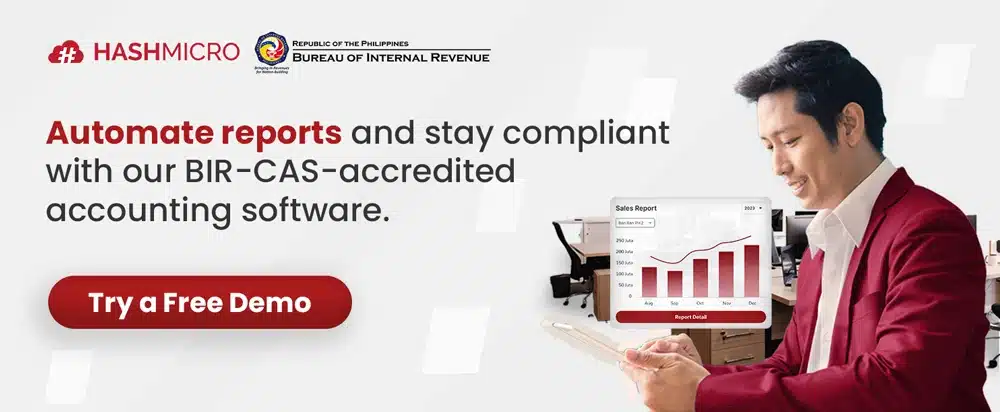As businesses in the Philippines move forward, many continue to face accounting challenges that can affect their financial health. Whether you run a small business or a large enterprise, understanding these issues is key to maintaining stability and compliance.
Accounting is a crucial role in financial decision-making, yet its complexities can lead to costly mistakes. According to the Department of Trade and Industry (DTI), many SMEs struggle with accounting inefficiencies, which can slow down growth and profitability.
Why risk financial setbacks when you can automate and simplify your accounting processes? HashMicro’s Accounting Software offers real-time financial tracking, automated reporting, and seamless tax compliance, helping businesses eliminate errors and improve financial accuracy.
Stay ahead of accounting challenges discover 16 common issues and how the right software can transform your financial management!
Key Takeaways
|
Table of Contents

What are Accounting Problems?
Accounting problems refer to the various issues and challenges that arise within a business’s accounting processes. These problems can range from simple data entry errors to complex issues like revenue recognition and regulatory compliance.
Understanding these problems and their root causes, such as human error, inadequate internal controls, and outdated technology, is essential for effective management.
Incorporating solid accounting principles, such as accuracy, consistency, and transparency, can help mitigate these issues. For business owners in the Philippines, being aware of these principles and maintaining vigilance can prevent small issue from escalating into significant financial challenges.
Common Causes of Accounting Problems
To effectively manage and prevent accounting issues, it is important to understand their root causes. Below, we will discuss some of the most common factors that contribute to these challenges and their potential impact on financial accuracy:
- Human error: Even the most experienced accountants can make mistakes. Simple data entry errors or overlooked calculations can lead to significant discrepancies that affect financial reports and decision-making.
- Outdated software systems: Relying on outdated or limited accounting software can impede efficiency and accuracy. Older systems may not include essential features needed for current compliance standards or seamless integration with other business tools, heightening the risk of mistakes.
- Weak internal controls: A lack of strong internal controls can create gaps in oversight and verification processes. This increases the chances of undetected errors or even fraudulent activities, which can compromise financial integrity.
- Inconsistent record-keeping: Maintaining consistent, accurate records is essential for reliable financial reporting. Inconsistent or delayed record-keeping can cause confusion, errors, and difficulties during audits or financial analysis.
- Rapid business expansion: While growth is beneficial, rapid expansion can overwhelm existing accounting systems. This can lead to incomplete or inaccurate financial reporting and difficulties in managing the influx of data effectively.
Understanding these common causes can help businesses identify areas for improvement and implement measures to strengthen their accounting practices.
16 Common Accounting Problems
Navigating accounting challenges in the Philippines requires a comprehensive understanding of various issues that can impact your business. Identifying these common issue is the first step toward developing effective solutions. With a clear grasp of these challenges, you can better prepare to address them proactively and enhance your financial management.
1. Cash flow management
Problem:
Effective cash flow management is vital for business success, but many owners struggle with maintaining accurate statements, risking liquidity issues. Poor management may cause difficulties in meeting short-term obligations, like paying suppliers, and could lead to business closure if ignored.
Solution:
To avoid cash flow problems, monitor inflows and outflows regularly for accurate financial statements. Using forecasting tools can help predict future needs and prevent shortfalls, ensuring your business stays financially healthy and meets its obligations.
2. Revenue Reporting
Problem:
Accurately recognizing revenue is crucial for maintaining correct financial statements, but many businesses struggle with complex transactions or long-term contracts. Incorrect revenue recognition can lead to misstated financial statements, causing serious issues like tax accounting liabilities and regulatory penalties.
Solution:
To prevent these problems, establish clear revenue recognition policies and ensure your accounting team understands the applicable standards. Regular training and updates on the latest standards can also help avoid errors, providing a true and fair view of your business’s financial health.
3. Payroll Inaccuracies
Problem:
Payroll errors are a common issue with significant consequences for both employees and the business. Mistakes in calculating salaries, taxes, or benefits can cause employee dissatisfaction, legal issues, and financial losses. These errors often stem from manual data entry, misinterpreted tax laws, or outdated payroll systems.
Solution:
To minimize payroll errors, automate the payroll process with reliable software that is regularly updated with the latest tax regulations. Regular payroll audits can also identify and correct errors before they escalate, ensuring accuracy and compliance with labour laws, which keeps employees satisfied and the business secure.
4. Data Input Errors
Problem:
Human error in data entry is a common cause of accounting problems. Even minor mistakes, such as entering the wrong figure or misclassifying an expense, can lead to significant discrepancies in your financial records.
These errors can affect financial reporting, tax filings, and decision-making processes, and can also impact compliance with International Financial Reporting Standards (IFRS). To reduce data entry errors, implement checks and balances within your accounting system.
This includes double-checking entries, using automated data entry tools, and providing ongoing training for your accounting staff. Consider looking at trusted entry journal examples to ensure that you’re making it correctly.
5. Regulatory non-compliance
Problem:
Staying compliant with local and international regulations is a major challenge for businesses, especially as tax laws and accounting standards evolve. Non-compliance can lead to penalties, fines, and damage to your business’s reputation.
Solution:
To ensure compliance, stay informed about regulatory changes and seek professional advice when necessary. Regularly review your accounting practices and conduct internal audits to identify and address potential compliance issues before they become problematic.
6. Security and internal controls
Problem:
Inadequate security measures and internal controls can expose your business to fraud, theft, and data breaches. Without proper controls, unauthorized individuals can easily access sensitive financial information, leading to potential financial losses and damage to your reputation.
Solution:
To enhance internal controls, implement procedures like segregating duties, restricting access to financial data, and regularly reviewing transactions for irregularities. Invest in cybersecurity measures, such as encryption and secure access protocols, to protect financial data from external threats.
7. Outdated accounting software
Problem:
Outdated accounting software can limit your business’s ability to manage finances effectively. It often lacks features necessary for modern challenges, like compliance with new regulations or integration with other systems. Also, old software is more prone to errors and security vulnerabilities, risking your financial data.
Solution:
Upgrading to Accounting platforms for Philippine businesses that is regularly updated and supported will greatly benefit your business. Choose software with automation, real-time reporting, and secure data storage to ensure efficient and secure financial management.
8. Fraud detection and prevention
Problem:
Fraud poses a serious risk to businesses of all sizes, and failing to detect or prevent it can result in significant financial losses. Common types of fraud, such as embezzlement, invoice fraud, and payroll fraud, can be challenging to detect without proper controls in place.
Solution:
To prevent fraud, establish a strong e-invoice system and regularly monitor financial transactions for irregularities. Implement whistleblower policies and train employees on fraud prevention to foster a culture of transparency and accountability. By taking proactive steps, you can protect your business from financial harm.
9. Strategic financial analysis
Problem:
Strategic financial analysis is crucial for making informed business decisions, but many businesses overlook this critical aspect of financial management. Without regular analysis, identifying trends, assessing financial health, or making strategic decisions that drive growth becomes challenging.
Solution:
To address this, invest in financial analysis tools that provide insights from your data. Regularly review financial statements and conduct profitability analyses to support informed decision-making. By prioritizing strategic financial analysis, you ensure your business stays on track to achieve its financial goals.
10. Expense management
Problem:
Effective expense management is vital for controlling costs and maximizing profitability, yet many businesses struggle with this aspect of financial management. Common challenges include overspending, lack of transparency in reporting, and difficulty tracking expenses in real-time.
Solution:
Implementing a system that offers real-time expense tracking and reporting can improve control over your business’s expenses. Additionally, establishing clear expense policies and training employees on responsible spending can reduce unnecessary costs. By enhancing your expense management practices, you ensure your business remains financially healthy and profitable.
11. Lease Measurement
Problem:
Changes to GAAP lease accounting standards have made financial reporting more complex, especially for lessee companies managing long-term leases. Shorter leases, such as office rentals, still require precise handling, and many businesses struggle with inaccuracies due to outdated processes or lack of training. These issues often lead to errors in amortization schedules and non-compliance with regulatory standards.
Solution:
To solve this, businesses can adopt specialized lease accounting software designed to automate calculations and ensure compliance with GAAP. Providing ongoing training for accounting teams ensures they stay updated on the latest standards, reducing errors and improving the accuracy of financial reporting.
12. Missing impairment write-downs
Problem:
Failure to record impairment write-downs and fair market valuations can create significant discrepancies in financial reporting. This often stems from inadequate assessment of changes in economic conditions or insufficient reviews of asset valuations, such as goodwill or inventory adjustments. These accounting issues can result in misstated financial statements and compliance risks.
Solution:
To address this, companies should establish regular reviews of financial statements and provide accountants with adequate training on GAAP requirements for asset impairments. Leveraging advanced accounting tools can also help automate these assessments, ensuring accurate valuations and proper financial disclosures.
13. Hiring and retaining talent
Problem:
Many businesses in the Philippines struggle to attract and retain skilled accounting professionals. The growing demand for accountants and financial experts has intensified competition, leading to high turnover rates and a limited talent pool. This creates challenges in maintaining operational efficiency and ensuring compliance with financial regulations.
Solution:
Companies should focus on offering competitive compensation packages, career growth opportunities, and continuous training programs. Additionally, leveraging internship programs and partnerships with universities can help identify and nurture fresh talent early. Implementing employee engagement initiatives can also improve retention rates and foster a loyal, skilled workforce.
14. Automation and artificial intelligence
Problem:
Many businesses are still reliant on outdated, manual accounting methods, making it difficult to keep up with modern standards. The lack of automation results in inefficiencies, higher error rates, and more time-consuming processes.
Solution:
Adopting advanced software of accounting automation and AI capabilities can significantly improve efficiency. These tools can automate repetitive tasks such as data entry, payroll processing, and reporting, reducing errors and allowing accountants to focus on strategic activities. Regular employee training on using these tools will ensure seamless implementation and maximize their benefits.
15. Tax law changes
Problem:
Frequent changes in tax laws and regulations in the Philippines create confusion and compliance risks for businesses. Failure to stay updated can result in penalties, inaccurate filings, and strained relationships with regulatory bodies.
Solution:
To address this, businesses should work closely with tax consultants or hire in-house tax specialists who monitor regulatory changes. Investing in tax-compliant accounting software that updates automatically to reflect the latest regulations can also simplify tax preparation and filing. Regular training for staff on new tax laws is equally important to ensure full compliance.
16. Economic instability
Problem:
Economic fluctuations, such as inflation, currency devaluation, and market uncertainty, present significant challenges for businesses. These factors can disrupt cash flow, increase operational costs, and make accurate financial forecasting difficult.
Solution:
Businesses can mitigate these challenges by adopting robust financial planning and risk management strategies. Maintaining a contingency fund and diversifying revenue streams can help stabilize cash flow. Regularly monitoring economic trends and seeking advice from financial experts can also aid in making data-driven decisions to navigate economic instability effectively.
How to Solve Common Accounting Problems
Effectively addressing accounting issues requires a combination of proactive strategies and the right tools. Identifying common issue and understanding their impact on your business is the first step. Once you’ve pinpointed these challenges, the next crucial step is to implement solutions that streamline processes and enhance accuracy.
Implement automation and technology
Leveraging automation and technology is one of the most effective ways to solve accounting challange . Automation tools streamline repetitive tasks like data entry, payroll processing, and invoice management, reducing errors and freeing time for strategic activities.
Adopting cloud-based accounting software also provides real-time access to financial data, enabling better decision-making and more accurate reporting. Beyond efficiency, technology enhances the security of financial data.
Modern accounting software includes features like encryption, secure access controls, and automated backups, protecting your business from data breaches and other security threats. Embracing automation and technology addresses common accounting challange and positions your business for long-term success.
Enhance internal controls and security
Strengthening internal controls and security measures is crucial for solving common accounting problems. Effective controls ensure the accuracy and reliability of financial data, while robust security measures protect against fraud and unauthorized access to sensitive information.
Enhance your internal controls by implementing procedures like segregating duties, reconciling bank notes regularly by using bank reconciliation software, and conducting periodic internal audits. These practices help identify and correct errors before they become significant.
Investing in cybersecurity measures such as firewalls, encryption, and secure access protocols also protects financial data from external threats. By improving internal controls and security, you safeguard your business against a wide range of accounting problems.
Regular financial audits
Conducting regular financial audits is essential for maintaining accurate and reliable financial records. Audits help identify discrepancies, errors, and areas where accounting practices may need improvement while also assessing the effectiveness of internal controls and ensuring compliance with regulations.
Maximize the benefits of financial audits by conducting both internal and external audits regularly. Internal audits allow your accounting team to identify and address issues before they escalate, while external audits provide an independent assessment of your financial records.
Staff training & development
Investing in the training and development of your accounting staff is vital for reducing human error and improving accounting efficiency. Regular training on the latest accounting standards, tax laws, and software tools ensures your team is well-equipped to handle modern accounting complexities.
In addition to formal training, consider offering on-the-job training and mentorship to help staff develop their skills. Encouraging continuous learning and professional development helps retain top talent and creates a more capable and confident accounting team.
Stay updated with tax laws and regulations
Keeping informed about changes in tax laws and accounting regulations is crucial for maintaining compliance and avoiding penalties. In the Philippines, tax laws and regulations frequently change, making it essential for business owners to stay updated on the latest requirements.
To ensure compliance, subscribe to industry newsletters, attend seminars, and consult with tax professionals who can guide new regulations. Regularly review your accounting practices and make necessary adjustments to keep your business compliant with applicable laws.
Read more: Manufacturing Accounting Software
Best Practices to Prevent Accounting Problems
Adopting best practices in accounting is essential for preventing issues before they escalate. This involves proactive measures such as regular monitoring and review of your financial practices. By staying vigilant and addressing potential problems early, you can maintain accurate records and ensure your business remains financially healthy.
Regular monitoring and review
Continuously monitoring and reviewing your accounting practices is key to preventing problems before they arise. Regularly reviewing financial statements, reconciling accounts, and monitoring cash flow helps identify issues early, allowing for corrective action before they escalate.
Establishing a routine for monitoring and review ensures that your financial records stay accurate and up-to-date. Set aside time each month to review accounting practices, addressing discrepancies or areas for improvement. By prioritizing regular monitoring, you maintain effective accounting practices and ensure your business’s financial health.
Adopt modern accounting software
Adopting modern retail accounting software is one of the most effective ways to prevent accounting problems. Today’s software offers features that streamline processes, reduce errors, and improve record accuracy.
When selecting software, choose solutions with automation, real-time reporting, and secure data storage. Cloud-based options are particularly beneficial, enabling access to financial data from anywhere and real-time team collaboration.
Establish clear procedures and policies
Clear procedures and policies are essential for consistency and accuracy in accounting practices. Establishing and documenting these procedures ensures that your team follows standardized processes.
Create a comprehensive accounting manual outlining procedures for tasks like data entry, revenue recognition, and expense management. Regularly review and update these procedures to keep them relevant and effective. By establishing clear policies, you create a more organized and efficient accounting system.
Leverage professional accounting services
Outsourcing accounting tasks to professional services can be a wise decision, especially if your business lacks in-house expertise. Professional accountants offer the knowledge and experience to manage financial records accurately and efficiently, helping you avoid common issues.
When selecting an accounting service, choose providers with a strong reputation and industry experience. Maintain regular communication to ensure they understand your business’s unique needs. By leveraging professional services, you focus on growing your business while experts handle the accounting.
How Can HashMicro’s Accounting Software Solve Your Accounting Problems?
Addressing accounting challenges requires the right tools, and HashMicro’s Accounting Software is crafted to meet these needs. As businesses in the Philippines face increasingly complex financial demands, this software offers a solution that ensures accuracy, efficiency, and security in managing your finances.
Here’s why HashMicro’s AI Accounting Software stands out:
- Automation of Repetitive Tasks: Eliminate manual errors and save valuable time by automating processes such as invoicing, payroll, and expense management.
- Real-Time Financial Reporting: Access up-to-the-minute financial data, empowering you to make informed decisions with confidence.
- Advanced Security Measures: Safeguard your financial data with state-of-the-art security features, including encryption and secure access protocols.
- Seamless Integration: Integrate effortlessly with your existing business systems, ensuring a smooth flow of information across your organization.
- Customizable to Your Needs: Adapt the software to fit your unique business requirements, allowing it to scale as your business grows.
By adopting HashMicro’s Accounting Software, you’re not only solving immediate accounting issues but also setting your business up for long-term success. This software provides the tools necessary to maintain financial stability, comply with evolving regulations, and focus on what truly matters—growing your business.
Conclusion
Managing accounting problems is a common challenge for businesses, but with the right strategies and tools, these issues can be effectively addressed. Enhancing cash flow management, improving internal controls, and leveraging technology are crucial steps to ensure your business remains financially healthy and compliant with regulations.
By staying informed and implementing best practices, you can build a solid financial foundation that supports long-term growth and success. HashMicro’s Accounting Software offers a comprehensive solution to these challenges, providing automation, real-time reporting, and advanced security measures to keep your finances on track.
Take control of your business’s financial future—try HashMicro today. Request a free demo and see how it can transform your accounting processes and set your business up for success.
Frequently Asked Questions
-
What is the common problem in accounting?
Common accounting problems include cash flow management issues, inaccurate data entry, revenue recognition challenges, payroll errors, and compliance with evolving regulations. These issues can lead to financial discrepancies, penalties, and inefficiencies in business operations if not addressed promptly.
-
How to solve accounting problems?
Solving accounting problems involves implementing automation tools, enhancing internal controls, conducting regular audits, and staying updated with tax laws. Training staff and adopting modern accounting software like HashMicro’s can also streamline processes and reduce errors, ensuring accurate and compliant financial management.
-
How to recognize accounting problems?
To learn about accounting problems, start with basic accounting courses, attend workshops, or consult accounting professionals. Reading industry blogs, following financial news, and using accounting software tutorials can also provide valuable insights into identifying and addressing common accounting challenges effectively.

























